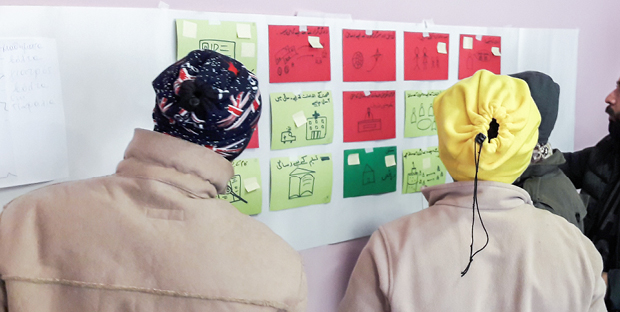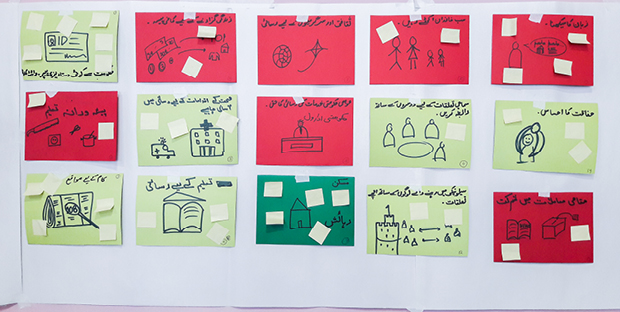During our second mission to Thessaloniki (Greece) as part of our support to the ongoing profiling exercise, we worked together with partners on finalising a plan for the analysis of the future profiling results. The Technical Working Group agreed that the results of this study would form the baseline for a longer-term local integration monitoring system along four dimensions: legal, economic, socio-cultural and political integration.

Using visual methods to encourage and enrich the focus group discussion with refugees, asylum seekers and irregular migrants in the Thessaloniki profiling exercise.
Building on the objectives elaborated during our first field mission and agreed upon by partners in the meantime, we worked with the Profiling Coordinator to refine the population mapping on refugees and irregular migrants. We also supported qualitative data collection and a one-day collaborative workshop with the Technical Working Group to define the analytical framework, which will be the foundation for the planned household survey. This includes a set of topics and indicators to measure the degree of local integration and to understand the future plans of refugees, asylum seekers and irregular migrants in the metropolitan area of Thessaloniki.
The one-day workshop gathered 15 Technical Working Group members in the Municipality of Thessaloniki, including the Municipality of Thessaloniki, UNHCR, IOM, DRC, NRC, Alkyone, Arsis, Solidarity Now, Filoxenia, OMNES, and Intersos. A draft profiling analytical framework was reviewed in two rounds of group work and finalised in plenary.
Each group focused on specific topics and was asked to specifically look into the relevance of related indicators based on the overall objectives – measuring local integration – as well as the local context. This way we ensured that the discussion centred on the information produced through the indicators and related questions, before spending time on the formulation of particular questions.
Prior to the technical workshop, three focus group discussions and one individual interview were held with refugees, asylum seekers and irregular migrants from different countries. Conducted together with the profiling partners Solidarity Now and Alkyoni, the objectives were twofold:

Focus group discussions were organised per group (refugees, asylum seekers and irregular migrants) and sex (men, women).
We learned from these discussions that some elements of integration were regarded as ‘basic’ and hence priority needs. These included aspects such as legal status, housing, job, health care and language. Elements like intra- and inter-community interaction, community engagement and participation in cultural activities, though important in the long run for integration, were viewed as coming second: for the groups interviewed, who had arrived recently in the city and were far from ‘integration’ as such, they were not relevant at this stage. The conversation also indicated that a weighting system (for instance, an integration scoring approach for long-term monitoring purposes) would not make sense since different groups prioritised differently depending on their legal and economic status, and in addition all groups described the elements as strongly interdependent.
The focus group discussions also made us realise that in the upcoming survey on what these groups are planning to do next, it made less sense to ask about future plans. Rather, the survey tool should focus on future intentions and the factors that can enable these intentions. In fact, across the discussions it became apparent that persons or families in such shifting and precarious situations, lacking security of their legal status and of subsistence means, were less likely to have concrete plans. They may have concrete intentions for the future; however, these largely depend on external factors.
The experience from Thessaloniki provided rich input for our greater efforts at JIPS to enhance community engagement throughout the profiling process. In fact, we were able to get active input from communities at an early stage in the profiling, i.e. to inform not only the overall analysis but also the methodology development.
The half-day training of facilitators and interpreters proofed very useful to achieve explorative discussions. Thanks to the recording and accurate transcripts of the conversations, we will be able to establish a detailed coding for an in-depth analysis of the data. In terms of the techniques used, we used visual methods such as maps to support discussion on familiarity with the city and the mobility, as well as to rate factors of integration.
Building on the agreement around indicators and analysis approach, the household survey questionnaire is now being developed. Data collection is expected to take place in the spring.